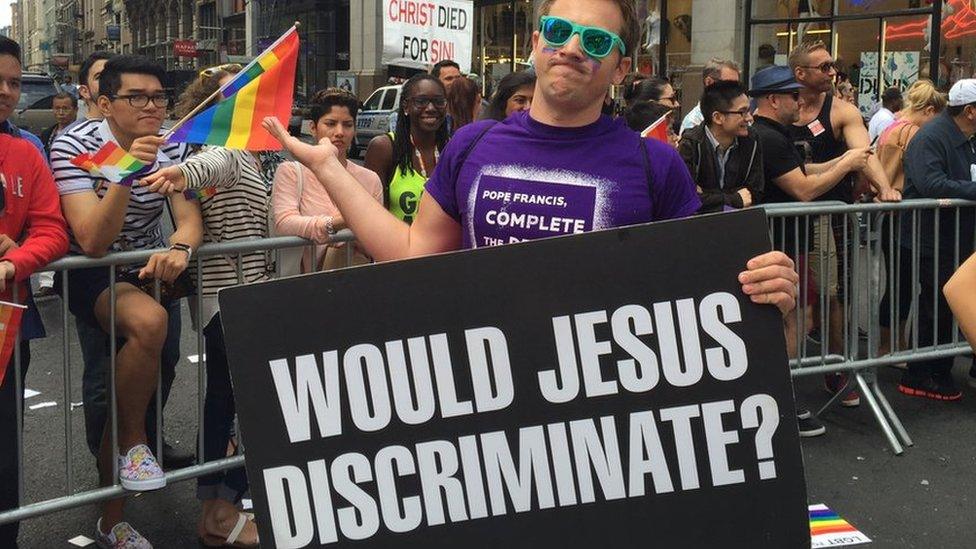Five tricky issues for the Pope in the US
- Published
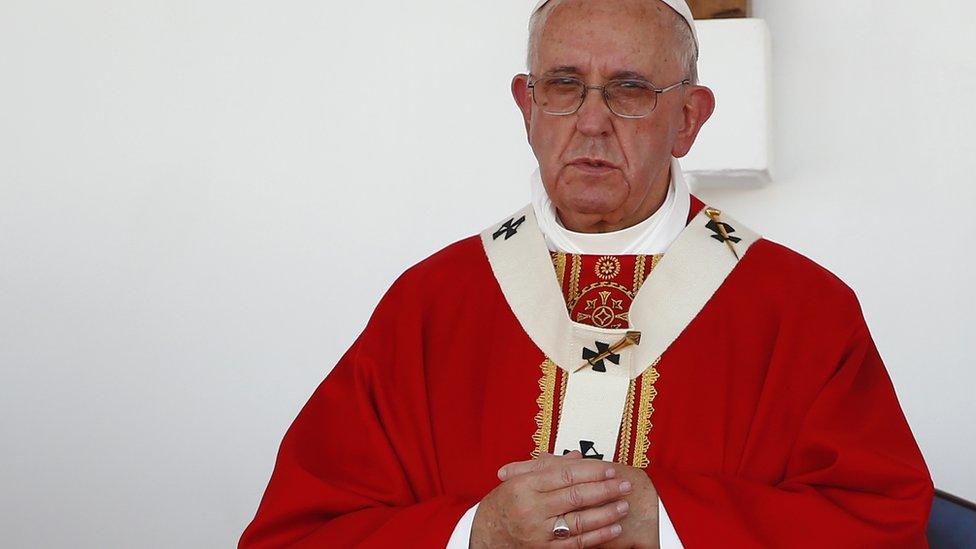
Pope Francis has visited Cuba prior to his US visit
Thousands will line the streets to see Pope Francis on American soil for the first time. But his stance on several issues has alienated him from certain sections of public opinion.
The Pope is much more popular in the US than his predecessor Pope Benedict XVI. According to Gallup, 59% of all Americans view him favourably, which is down from previous highs but still considerable.
Many have been impressed by his humility, commitment to helping the poor and his modern communication style, complete with 22 million followers on Twitter.
That will be reflected in the crowds who will greet him in Washington, New York and Philadelphia. "People want to feel his magic," says New York Mayor Bill de Blasio.
But in a few areas, his views strike a note of discord among some Americans.

Warm relations with Cuba
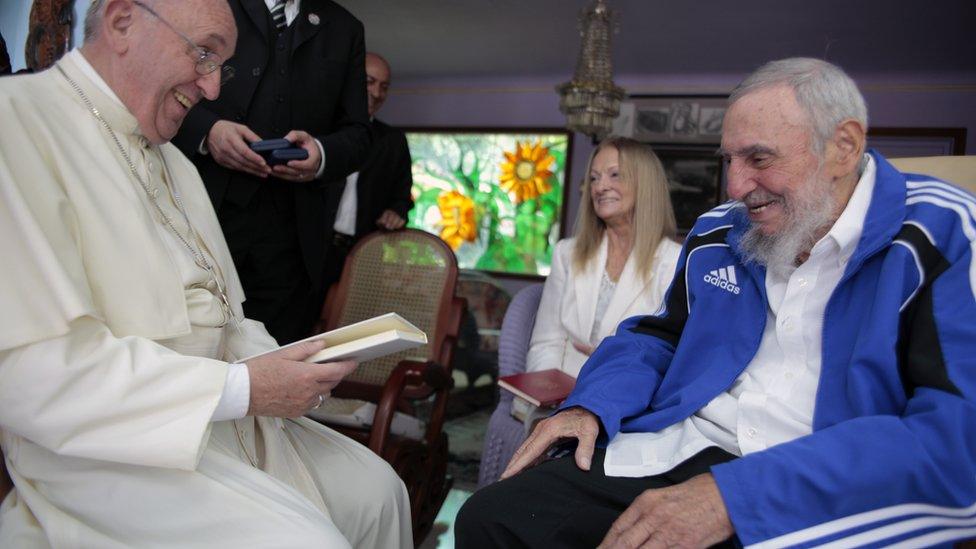
Pope Francis was instrumental in the US-Cuba deal which opened relations between the two countries after five decades
Pope Francis helped broker the deal between the US and Cuba that thawed 53 years of icy relations between America and the communist country. But this makes him unpopular with the American right.
New Jersey Governor and Republican presidential candidate Chris Christie has said Pope Francis is "wrong" on Cuba.
"I just think the pope is wrong," said Mr Christie, external, who is Catholic, on Sunday. "The fact is his infallibility is on religious matters, not on political ones. I just happen to disagree with the pope on this one."
Mr Christie said Cuba harbours fugitives, like Joanne Chesimard, who was convicted of killing a New Jersey State Trooper in 1973 and has since found political asylum in Cuba.

Climate change
Pope Francis has been vocal about his concern for climate change and called on western nations to do more - at once drawing the ire of sceptics.
US Representative Paul Gosar of Arizona is boycotting the pope's address to the US Congress and said in an opinion piece, external why.
"When the Pope chooses to act and talk like a leftist politician, then he can be expected to be treated like one," wrote Mr Gosar.
"If the Pope wants to devote his life to fighting climate change then he can do so in his personal time. But to promote questionable science as Catholic dogma is ridiculous."

War on inequality
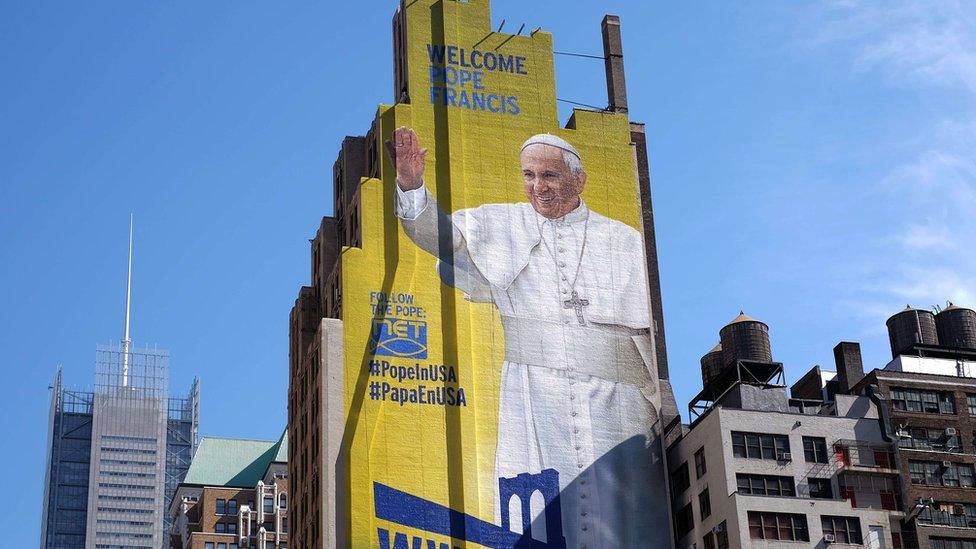
Pope Francis, seen on a billboard in New York City, will go from communist Cuba to the capitalist US
Pope Francis has not pulled any punches in criticising what he calls "an economy of exclusion and inequality", and called on the rich to share their wealth.
Biographer Paul Vallely says this sympathy for the poor has brought the US and its unrestrained capitalism "into papal crosshairs".
Some wealthy American Catholics have expressed concerns, even indicating they may withdraw their financial support to the Church if the Pope continues his crusade against excess and free markets.
Valley writes in Politico Magazine, external: "The pope's aversion to red-blooded capitalism is just too apocalyptic for America's tycoons - overlooking the curative powers of technology, ignoring the way the free market had lifted millions from poverty and refusing to consider that Catholic teaching on contraception is partly to blame for our overcrowded planet."
Conservatives like radio host Rush Limbaugh have denounced his beliefs as "pure Marxism".
And Senator Mike Rounds, a former South Dakota governor and a Roman Catholic, says he disagrees with the Argentinian pope's view of capitalism.
"Personally, I think if you think of the quality of life that has been delivered to millions of people around the world and freedoms that we find for people around the world, most of it has happened because of innovation due to capitalism, and because the United States of America exists," Rounds said.

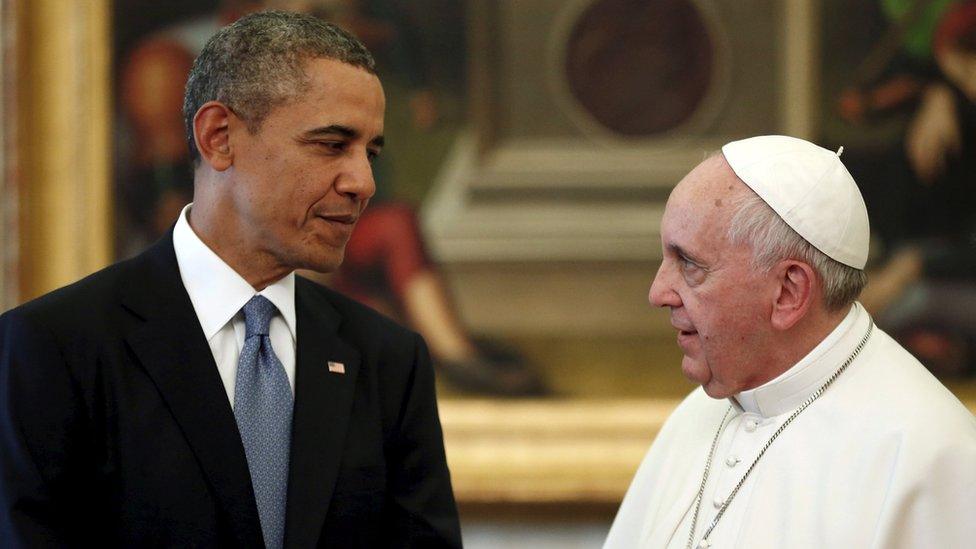
Pope Francis has been more merciful on social issues but has kept the traditional Catholic line on gay marriage and abortions
Catholics in America:
80 million baptised as Catholics
Six of the nine Supreme Court justices are Catholic
31% of the US Congress (22% general population)
One Catholic president (JFK) and one vice-president (Joe Biden)
Six Catholic Republicans running for president, the most ever
Source: New York Times

Social issues
What do gay Catholics want from the Pope?
It is not just those on the conservative right who differ with Pope Francis. Liberals note that he holds traditional Catholic views on gay marriage, abortion and contraception, though he has softened the tone in talking about them.
Earlier this month he relaxed forgiveness rules on abortion for the coming Jubilee Year, allowing all priests to forgive it rather than only bishops.
That does not go quite far enough, a New York Times opinion piece argued earlier this month.
"While the pope's announcement has been hailed as evidence of the church's new, softer approach, it's actually the latest example of the modern anti-abortion strategy: Portray women as victims who need to be protected from themselves with laws that restrict abortion rights," writes, external Jill Filipovic, who went on to argue that the move covers up the "real problems" the Catholic Church's views on anti-contraception and anti-abortion cause.

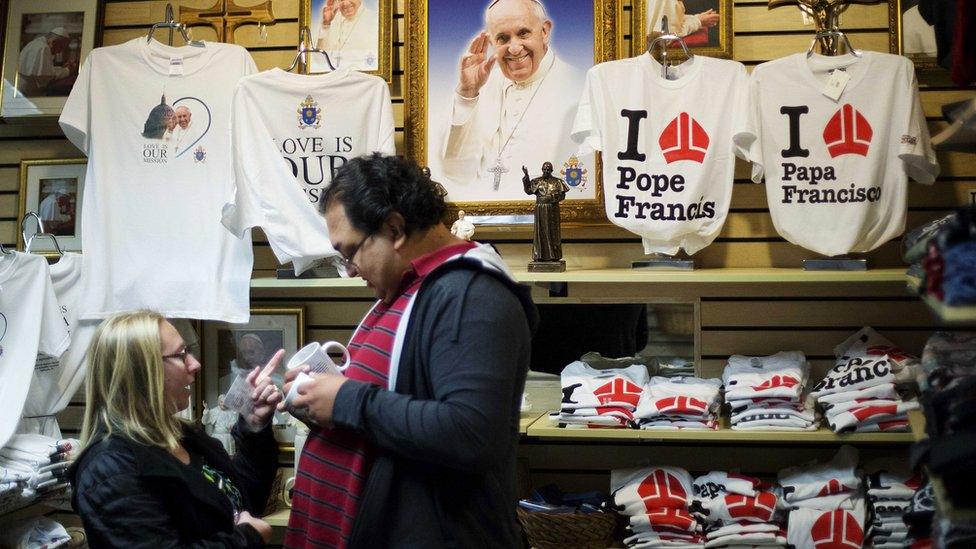
A crowd of about 30,000 is expected for Pope Francis' service at the National Shrine of the Immaculate Conception in Washington
Canonisation of first Hispanic saint
The first Latin-American pope will give the US its first Hispanic saint when he canonises Junipero Serra, a Spanish Franciscan who founded a mission in California in the 18th Century.
But Native Americans view the missionary as someone who aggressively imposed Catholicism on their ancestors.
Pope Francis has in the past apologised for the treatment of indigenous people, and could do so again at the canonisation Mass on Wednesday at the Basilica of the National Shrine of the Immaculate Conception, in Washington.
- Published21 September 2015
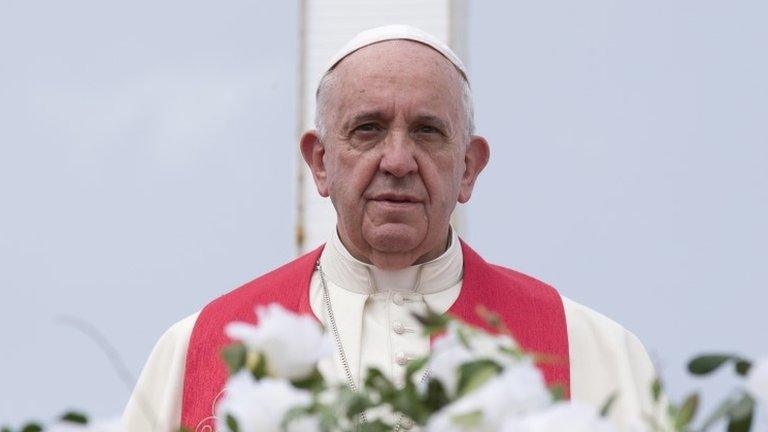
- Published22 September 2015
